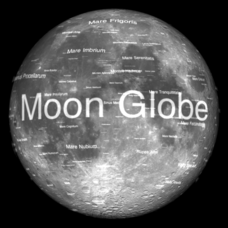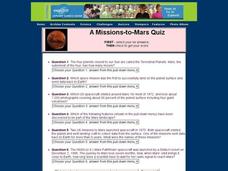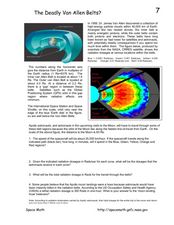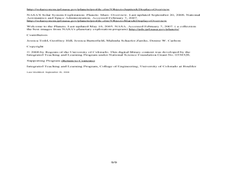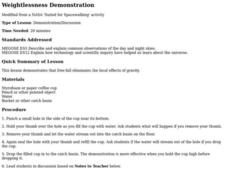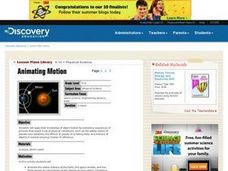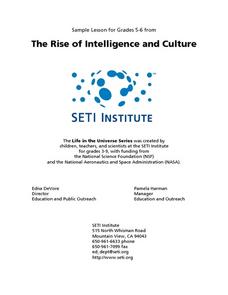Curated OER
Specializing in Space
In this literature book review activity, young scholars read a nonfiction book about space or space exploration before choosing a topic to explore further. They choose from 7 activities such as designing a model, writing a letter, write...
Curated OER
Hello, Is Anybody Out There? (cont.)
In this space science worksheet, students read an informative passage about radio waves and the possibility of sending messages in space. The passage describes a "Sounds of Earth" record on the Voyager satellite which contains messages...
NASA
Cleaning Water
From their sweat to the water vapor in their breath, astronauts recycle every possible drop of water while in space. After watching a short video describing the different ways materials are recycled and reused in space shuttles, young...
Curated OER
Apollo Moon Landing
Students explore paper rockets, learn about the Apollo Program and Apollo spin-offs, and use simple office supplies to design and create a new useful product. This amazing plan is incredibly well written and leads students through a...
Curated OER
Student Experiment Flies On NASA Space Shuttle!
Pupils design and construct an experiment that will be launched into space aboard a NASA research shuttle. How better to gain and appreciation for (and, hopefully, a love of) scientific investigation than to do real science and be...
Curated OER
Distance in Space
Sixth graders explore space science by measuring distances between planets. In this solar system lesson, 6th graders view a Bill Nye video and discover the conversion between the metric system and imperial measuring systems. Students...
Midnight Martian
Moon Globe
Not just a simple globe of the moon, this interactive version allows you to choose lighting according to the location of the sun, views from different positions on Earth, and more! Satellite images and topographic data have been combined...
Curated OER
Thinking About Technology: What Is It? How Can It Help Us?
What is technology and how can it help us? Using a worksheet, students read a list and choose practical applications of scientific knowledge, brainstorm examples of home, school and hospital technology, graph answers in a pie chart, and...
Curated OER
10 More or 10 Less
Practice adding and subtracting 10 with this outer space worksheet. On the top, scholars match digits floating in stars with sums inside a spaceship. Next, they do the same with subtracting 10, connecting numbers to differences. These...
Curated OER
Solar System
Explore the solar system in detail, from it's origins to its components. Visual data gathered by actual space missions has been used to create the images and animations on each page of this stellar electronic book about the solar...
Curated OER
A Mission-To-Mars Quiz
In this space exploration worksheet, students complete a 6 question multiple choice on-line interactive exercise about the exploration of Mars.
Curated OER
The Deadly Van Allen Belts?
In this Van Allen Belts instructional activity, learners read about the deadly affects of the high energy particle clouds located around the Earth. Students answer 4 questions about the dosages of radiation astronauts receive in the...
Curated OER
Life on the Moon
Students study the physical properties of the Moon. In this life on the moon lesson students describe the ways life on the Moon would be different than on Earth.
Curated OER
Scatterplots
In this statistics worksheet, students create a scatter plot based on their analysis of data provided form the space shuttle Challenger disaster. The five page worksheet contains four questions. Answers are not provided.
Teach Engineering
Air Pressure
Investigate what is pushing on us. An intriguing activity has pupils calculate the amount of force on various squares due to air pressure. Using the data, individuals create a graph in the third activity of the Up, Up and Away unit...
American Association for the Advancement of Science
Gravity Launch
Getting a ship into orbit isn't rocket science. Oh, wait...that's exactly what it is! Learn the basics of the concepts of thrust, launch angle, and gravitational pull in this fun and progressively challenging game.
Curated OER
Mars and Jupiter
Students learn about how engineers help us to know about Mars and Jupiter. In this Mars and Jupiter lesson plan, students are introduced to the telescope, deep space antennas, spacecraft, and planetary rovers that engineers designed to...
Curated OER
TE Activity: A Roundabout Way to Mars
Students investigate Hohmann orbit transfers using cardboard and string while focusing on the orbits of Earth and Mars. They look at the planets orbits around the sun and transfer orbit form one planet to another to determine what a...
Curated OER
Is Urban Sprawl Causing Us To Lose More Than Ground?
Students map the changes that occur in the land as a result of urban sprawl. They explore the problems that paving and building have on the watershed and the habitats on the Northshore.
Curated OER
Weightlessness Demonstration
Young scholars explore the concept that free-fall eliminates the local effects of gravity. They discuss what an Earth-orbiting spacecraft experience is like as well as the terminology of weightlessness. Their lab experiment commences.
Curated OER
Animating Motion
Students apply what they recall about objects in motion by animati ng sequences of pictures that model a set of physical conditions. They animate the orbital motions of the Earth, the space shuttle, and the Moon based on calculations of...
Curated OER
Proportionality, Ratios and Constant Variation
Students use Scion Image to estimate the proportion of space images. In this proportion lesson, students investigate the online site of Image of the Orbitor and relate the dimensions and sizes to known sizes.
Curated OER
Extraterrestrial Communication: Can We Talk to Anybody Out There?
Students examine the possibilities of communication with other living organisms within our solar system through research and hands on activities, as well as observing and analyzing teacher demonstrations.
Curated OER
Behind the Mission To Mercury
Learners assess the goals, benefits, success, and limitations of technology (instruments) on a space mission.








